Patrice
"I think healing is a process. Sometimes it can happen right away, but when you fall, and you scrape yourself, there's this period where it's healing up, and it's irritating, and your skin itches. I think that's the waiting period that we don't like, and it sometimes takes a while, but then you do get healed from that process."
Patrice came to mind right away for this project, even though I really didn't know her all that well. She's married to Craig, my friend and former boss, who I've known for about ten years. Every once in a while, Patrice would bring a kid or a new baby into the office for a visit. Craig and Patrice have six children together: Immanuel (15), Daniel (13), Linnea (12), Luke (10), Sam (6) and Simon (5) and I wanted to tap into the energy it takes to make that work. Patrice and I talked about healing, creative play, motherhood and teamwork. With the portrait, I wanted to express her sense of calm and control, and her desire and ability to help her kids focus and find peace. Her kids are what she moves, her energy teaching and affecting them. Her telekinetic moment needed to be calming, gathering, and quieting, one communicated with just a glance or a look. In all honesty, this is the only portrait I shot twice. I mention this because this fun family was willing to perform for me when I had no idea what I was doing and again when everything finally made sense. The first iteration of the project involved paper on strings as I was trying too hard to insert objects into the scenario. Photos from both shoots are included below.
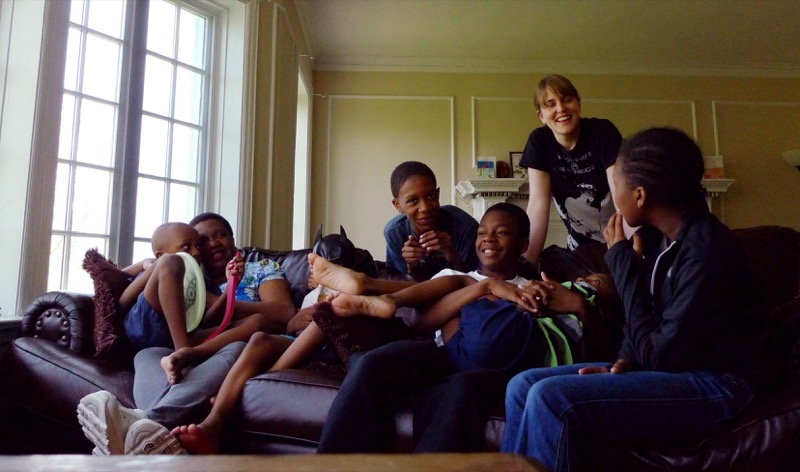
Lori: How would you describe yourself? Who are you? I know it's a big question.
Who am I? That's a good question. Wow. Of course I couldn't do any of this without the help and the care of Craig. And our faith is the cornerstone of who we are. I believe that I'm everything that I need to be at the time. It changes, because I could tell you who I am now and about five years from now it'll be something totally different. Ten years ago, I was a working mom. I did this thing and that thing.
Right now I'm a stay-at-home mom, but that's going to change in just a little while because Simon will be at school. It'll be a little bit of an empty nest and so who I define myself as, that's going to change because the kids will be all gone and, for eight hours of a day, it'll just be me. I might decide to take up some new craft or something like that.
I hope that I'm someone that is loving and kind. But I can still be hardcore sometimes. My kids say, "Mom, you're not as hardcore as you think you are."
I think I'm pretty hardcore myself, but I love them so much and they all appreciate it. I hope that I partner with them to make them into a team, they work together so well. Growing up with me and my brother, we were always bickering and stuff like that. When I look at them, all of them, they have their partner and even though it's noisy and that probably gets to me, or everybody else a little bit more, it's noise that is full of love for each other. They're so playful with each other. I hope that is something that they've seen through me, and the environment that we create together.
They seem to be very creative. They write a lot of stories.
Imaginative play. Everybody has a costume around here. There's the Woody outfit that Sam had on and Simon had a costume too. That was probably passed down from Immanuel and Daniel. They love to build, they love to tell stories. Immanuel and Daniel will spend all day having a continuing saga of a story that they're telling each other verbally, so they're like storytellers to each other.
Some of the stories I have no idea...Sometimes I'm like, "How do you carry this story on in your head 24 hours a day?" They're going to the middle of the night talking to each other about stuff, and they draw things. Daniel has journals and journals of drawings and they've created this whole empire of the things that they want to do. It's called Funland.
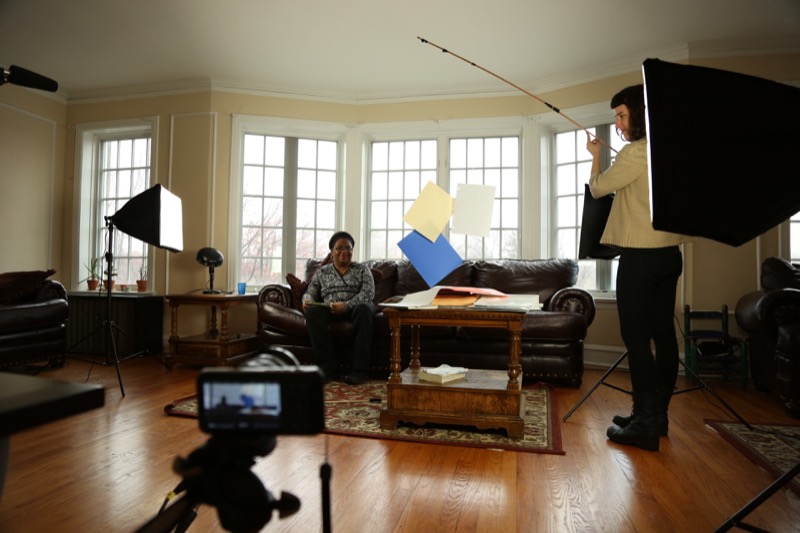
They have their own designer characters with their own designer capes and faces and weaponry and all of this stuff. You think about that kind of stuff when you're a kid and then you grow out of it, but I hope they continue it. I think it fuels them in their own creative ways. Immanuel wants to be an engineer, Daniel wants to be an artist, Linnea loves to read and she writes creatively, Luke wants to be an actor, Sam and Simon, they just love moving and dancing and creating.
We've always tried to create that creative environment, letting them do things that really have them think about the things that they want to do later on in life, because creative play is how you learn. When they were going to the selective enrollment schools, I would see a lot of parents out there with their kids practicing with flashcards.
I would look at that and think, "That would drive me nuts." In the beginning, with Immanuel and Daniel, I was like, "Am I doing enough?" "Should I be out there with maps and all of these flashcards and things?" In the long run, they excelled just as well as all of the other kids. They're naturally going to learn creativity and I think that fuels it everything else.
Right, and they're going to learn from each other. They've got this great team at home.
Yes.
You were in Beverly/Morgan Park for 20 years or so? And you just moved up to Evanston and are right on the Chicago border. Can you talk about why you guys made that move and what it's done for you?
It has a lot to do with the stresses of schooling. All of them are brilliant in their own different kinds of ways and the whole thing about the Chicago Public School System is that they have this elaborate, strenuous testing to get into the best schools. It's highly competitive and what winds up happening is, if you have a big family like we do, then you have four or five kids spread out all over the place.
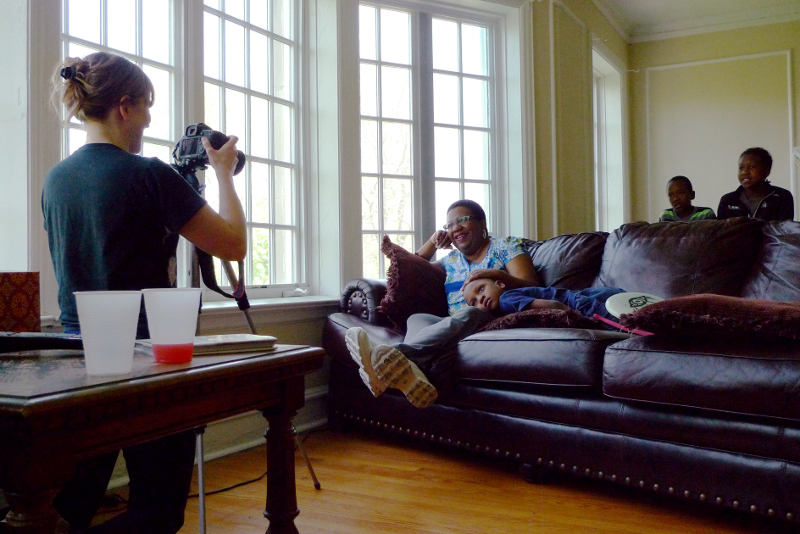
Right now we have sets of kids in three different schools and they're five minutes away from each other. I remember when they were babies, I had to go from one end of town to the other end of town, and with little babies in tow. It was just so stressful. I developed high blood pressure and all kinds of worries. We have kids with special needs and stuff like that, with allergies. If somebody got sick on one end of town, I'd have to rush over there and then come back all the way.
Finally, in their last year, they all went to our local neighborhood school, which is a good school. We could have done that at first, but we wanted to give them, everybody, an opportunity. We tried the rat race kind of thing, like, "Okay, this one can get into the gifted school, and this one can go to the classical school, and this..." It was just horrendous.
Now everybody is in their own place, I don't have to test and it's diverse and everything. We had diversity out there, but you had to pay for it, literally, in one way, emotionally.
You've mentioned to me that you have a couple of kids with ADD, and a couple of kids with severe allergies. You've also talked to me about how one of the ways you saw yourself was as a healer and that you were into this idea of healing. I'm wondering if you could explain that a little bit.
I think healing is a process. Sometimes it can happen right away, but when you fall, and you scrape yourself, there's this period where it's healing up, and it's irritating, and your skin itches. I think that's the waiting period that we don't like, and it sometimes takes a while, but then you do get healed from that process.
I think that itching period, that process of healing, is actually what helps us to learn and how to figure out how things work, and how the body works. Over a period of time, I found out that the first kid had an allergy. I'm like, "What happened? How did this happen?" You're trying to figure out, "What can I give him? What can I not give him?"
By the time the second child comes around, you're cautious for it, but you've had some experience, you're not going to take that same fall again, and you know how to protect yourself from it. You just build up those kind of things. Then, it took several years for me to try to figure out what was going on with Daniel, that he had ADD. It's just like, "He knows it. He's brilliant, but it's taking him a while, he's not focusing on getting the thing done." At the school, they're like, "Oh, Mrs. Downs, but he knows what he's doing. I just don't think he's applying himself." It took us up until he was 10 or 11 to figure out what was really going on. That's the process that you have to go through. Even though we took all of these scrapes and bruises, let's find a way to make it better so that you can function in the world, and that you can be who you need to be, and thrive at who you need to be.
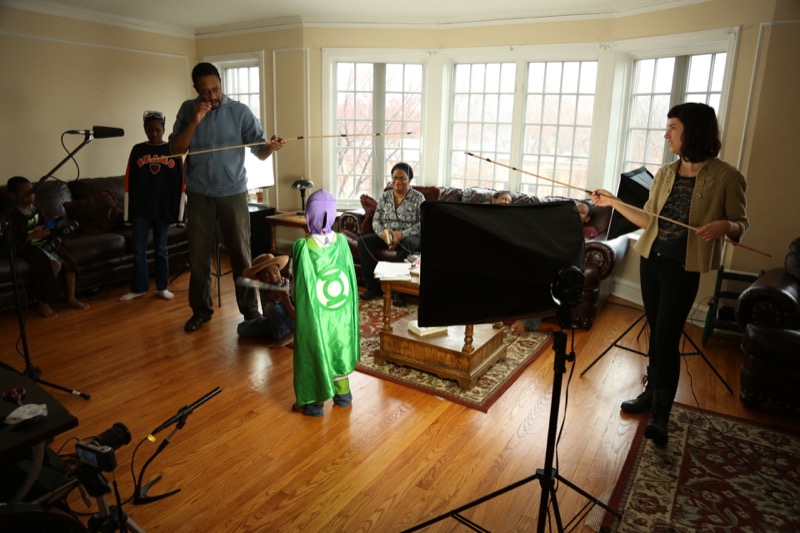
I think what happened to me is just the whole healing of who you traditionally think a mom should be. I'm like, "Oh, I'm supposed to be making chocolate chip cookies and peanut butter and all of this," but that changes if 50% of them are allergic to nuts. You have to redefine who you are. You can't take the whole matrix of who everybody else is and, "Oh, I want to be like that person. I'm going to draw things on the sidewalk with my kids." Two of my kids have chalk allergies, so what do I do?
It really has forced me to think of creative ways and a healing process so that they can go on and be who they need to be.
And so they're not held back by those things and they're not embarrassed or anything, too.
Yes.
You've talked a lot about staying "open" to life, was the phrase that you used, and letting life take you where it needs to go.
I think a lot of times, we have this grand plan of, "Okay, in five years, I want to get married and have kids, and this, and that. In another five years, I want to do this thing, and I have the job that I want." I think a lot of times, you can get so caught up into thinking we're fitting simple puzzle pieces together when really, the puzzle pieces are all over the place and you really have to search through.
I think it's a really big puzzle, like a hundred piece puzzle. You have a hundred piece puzzle, and you really have to look through the things and put them together. And then some people see the primary puzzle. You have the duck piece, and it's shaped like a duck, and you put it in the duck-shaped hole. I think that originally when we're 20 or something like that, we have that primary thinking, like, "Okay, that's what the duck looks like. Let me stick it in there."
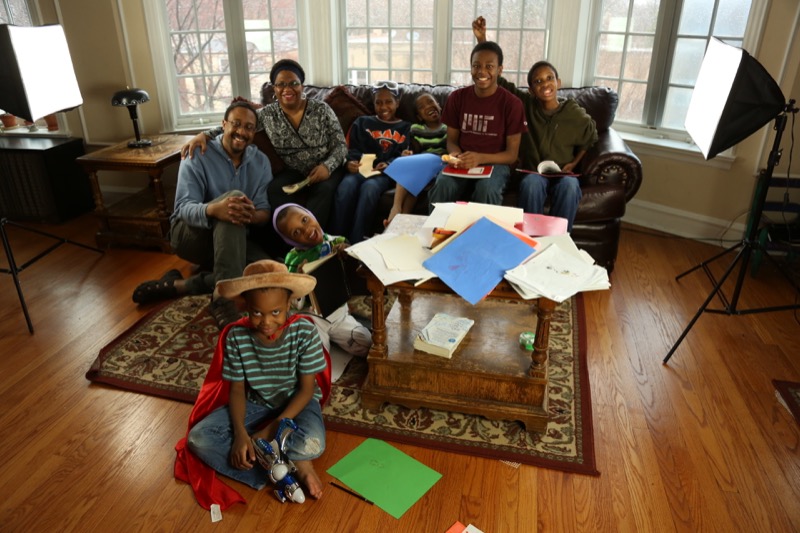
Really, it's a hundred piece puzzle, and you really got to search through to see where this piece fits, and that piece fits and when you start putting it together, it doesn't really look like the box yet. Then when you look at it, you feel a bigger sense of accomplishment of what you're doing, because you've had to work with more instead of these primary pieces of, "It says duck, so the duck goes in here, or here's his cow, and the cow goes here."
That's a great metaphor. Also, I like thinking about it, too, it's like sometimes in those big puzzles, you're like, "I can do the barber pole on the main street. That's easy. These three pieces match," but then sometimes you start working on the sky, and that takes you four weeks just to do that one part, because some parts are more complicated, and then somehow also more rewarding.
I'm trying to figure out how to phrase this next question, because I don't really know what I want to ask. I'm wondering if there's anything in your life where, and maybe it's your relationship to the city that you've been in your whole life, but something about being a woman, and not just a mother, but just you as an individual. Has that given you a particular kind of strength or perspective? Have you experienced particular setbacks? And do you even think much about it, or are you just Patrice?
There are certain parts, yeah. I think I would be a lot different, and this is a strange thing to say, but the feminine part of who I am is strangely connected to me having a daughter. As you know, there is an abundance of male testosterone in the house, and I think having a daughter and being a mom, had I just had boys, I probably would have been a different kind of person, a different kind of mom. But she gives me just enough edge to remind me to tune in to some softer things, because I didn't really growing up, I was a different kind of girl. I didn't like playing with Barbie dolls and stuff like that, so I was kinda worried when my daughter came along. We played dolls and stuff like that, but it was arts and crafts and more stuff like that, more creative things. I think she's helped me stay in tune with being creative.
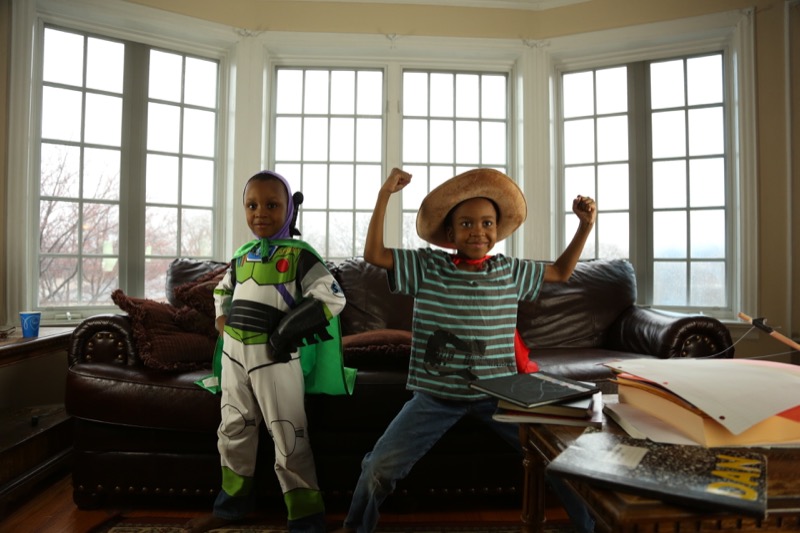
There's a different kind of intuitiveness that balances stuff, especially being in a house full of boys. And I see it in her, too. I can ask either one, my oldest son or Linnea, to do the same task, like help your brother get dressed. And she'll take time to make sure that someone's teeth are brushed just right, or their hair is combed right. And my oldest boy is like, "Hey, let's just go. We don't have time." He'll take them in the bathroom and just say, "Okay, here's the toothpaste, here's the brush. Do what you need to do, I'm leaving." I think that kind of extra care that, I mean, guys can do it, too, but I think it's intuitive for women. I hope that I add that to everything.
Ultimately, it's a group of people and we all work together as a team. We do our things together, and based on our faith and our love for each other and how we want to experience the world in a creative way. I hope that they always carry that from generation to generation.
Are you going to have any more kids?
Oh, no.